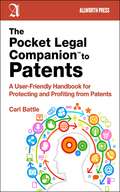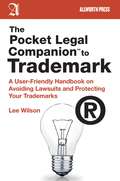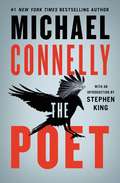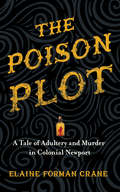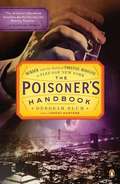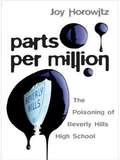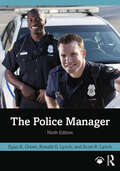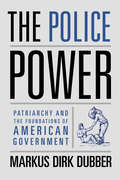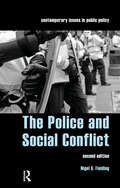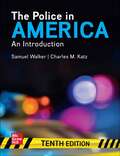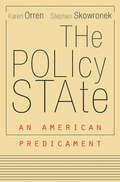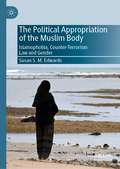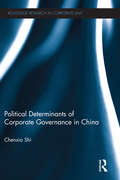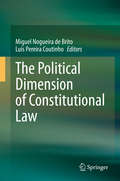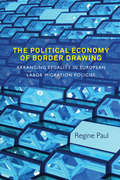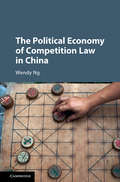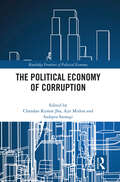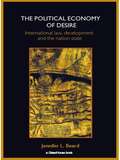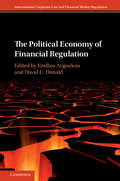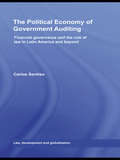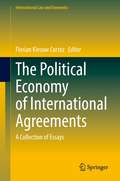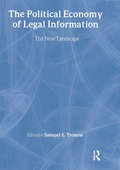- Table View
- List View
The Pocket Legal Companion to Patents: A Friendly Guide to Protecting and Profiting from Patents
by Carl BattleMany great ideas fail because the inventors do not take the appropriate steps to protect, promote, and profit from their ideas. This friendly guide will walk you through everything that needs to be done before you can expect to realize financial gain from your invention.Experienced patent attorney Carl W. Battle provides methods for commercializing your invention, sources of information and assistance, and helpful guidelines for obtaining a US patent on your idea. Specific topics include:Using patent attorneys and agents Dealing with invention brokers and promotion firmsMaintaining confidentiality of your ideas Obtaining foreign patent rightsEnforcing your patent against infringementLicensing opportunitiesAnd much more This invaluable handbook also offers information that can assist in the selection of an attorney or patent agent, and will help you to get involved and monitor the patent and marketing process. Finally, easy-to-use forms and step-by-step instructions give you the option of saving money by handling the patenting and commercializing processes without hiring a patent attorney or invention broker.If you have an idea for an invention that could improve productivity, create jobs, or solve some long-standing problem, then pick up this Pocket Legal CompanionTM and learn how to maximize your profits.
The Pocket Legal Companion to Trademark: A User-Friendly Handbook on Avoiding Lawsuits and Protecting Your Trademarks (Pocket Legal Companions)
by Lee WilsonThis book, a primer for the entrepreneur, is filled with valuable and ready-to-use information on using trademarks to avoid lawsuits and protect your ideas. Easy to follow and affordable, this helpful guide will teach you how to manage your trademark to maximize profits, avoid problems, and coexist with other marketers while you market your own product. It also provides answers to your questions about when to call a lawyer and how to avoid needing one. Finally, it offers a full briefing on the problems associated with selecting protectable trademarks that do not infringe established marks, what happens if trademarks are selected carelessly, and what to do if someone infringes your trademark. This handbook will save readers expensive lawyers' fees, and will make an invaluable addition to the library of anyone who markets a product or service.
The Pocket Oracle and Art of Prudence
by Baltasar GraciánWritten over 350 years ago, The Pocket Oracle and the Art of Prudence is a charming collection of 300 witty and thought-provoking aphorisms. From the art of being lucky to the healthy use of caution, these elegant maxims were created as a guide to life, with further suggestions given on cultivating good taste, knowing how to refuse, the foolishness of complaining and the wisdom of controlling one's passions. Baltasar Gracian intended that these ingenious aphorisms would encourage each reader to challenge themselves both in understanding and applying each axiom.
The Poesis of Peace: Narratives, Cultures, and Philosophies
by Lenart Škof Carool Kersten Klaus-Gerd GiesenExploring the relations between the concepts of peace and violence with aesthetics, nature, the body, and environmental issues, The Poesis of Peace applies a multidisciplinary approach to case studies in both Western and non-Western contexts including Islam, Chinese philosophy, Buddhist and Hindu traditions. Established and renowned theologians and philosophers, such as Kevin Hart, Eduardo Mendieta, and Clemens Sedmak, as well as upcoming and talented young academics look at peace and non-violence through the lens of recent scholarly advances on the subject achieved in the fields of theology, philosophy, political theory, and environmentalism.
The Poet: A Novel (Jack McEvoy #1)
by Michael ConnellyFROM THE #1 BESTSELLING AUTHOR OF THE HARRY BOSCH AND LINCOLN LAWYER SERIESAn electrifying standalone thriller that breaks all the rules! With an introduction by Stephen King. Death is reporter Jack McEvoy's beat: his calling, his obsession. But this time, death brings McEvoy the story he never wanted to write--and the mystery he desperately needs to solve. A serial killer of unprecedented savagery and cunning is at large. His targets: homicide cops, each haunted by a murder case he couldn't crack. The killer's calling card: a quotation from the works of Edgar Allan Poe. His latest victim is McEvoy's own brother. And his last...may be McEvoy himself.
The Poison Plot: A Tale of Adultery and Murder in Colonial Newport
by Elaine Forman CraneAn accusation of attempted murder rudely interrupted Mary Arnold’s dalliances with working men and her extensive shopping sprees. When her husband Benedict fell deathly ill and then asserted she had tried to kill him with poison, the result was a dramatic petition for divorce. The case before the Rhode Island General Assembly and its tumultuous aftermath, during which Benedict died, made Mary a cause célèbre in Newport through the winter of 1738 and 1739.Elaine Forman Crane invites readers into the salacious domestic life of Mary and Benedict Arnold and reveals the seamy side of colonial Newport. The surprise of The Poison Plot, however, is not the outrageous acts of Mary or the peculiar fact that attempted murder was not a convictable offense in Rhode Island. As Crane shows with style, Mary’s case was remarkable precisely because adultery, criminality and theft, and even spousal homicide were well known in the New England colonies. Assumptions of Puritan propriety are overturned by the facts of rough and tumble life in a port city: money was to be made, pleasure was to be had, and if marriage became an obstacle to those pursuits a woman had means to set things right.The Poison Plot is an intimate drama constructed from historical documents and informed by Crane’s deep knowledge of elite and common life in Newport. Her keen eye for telling details and her sense of story bring Mary, Benedict, and a host of other characters—including her partner in adultery, Walter Motley, and John Tweedy the apothecary who sold Mary toxic drugs—to life in the homes, streets, and shops of the port city. The result is a vivid tale that will change minds about life in supposedly prim and proper New England.
The Poisoner's Handbook: Murder and the Birth of Forensic Medicine in Jazz Age New York
by Deborah BlumEqual parts true crime, twentieth-century history, and science thriller,The Poisoner's Handbookis "a vicious, page-turning story that reads more like Raymond Chandler than Madame Curie"(The New York Observer) A fascinating Jazz Age tale of chemistry and detection, poison and murder, The Poisoner's Handbook is a page-turning account of a forgotten era. <p><p> In early twentieth-century New York, poisons offered an easy path to the perfect crime. Science had no place in the Tammany Hall-controlled coroner's office, and corruption ran rampant. However, with the appointment of chief medical examiner Charles Norris in 1918, the poison game changed forever. Together with toxicologist Alexander Gettler, the duo set the justice system on fire with their trailblazing scientific detective work, triumphing over seemingly unbeatable odds to become the pioneers of forensic chemistry and the gatekeepers of justice.
The Poisoning of an American High School
by Joy HorowitzIf it can happen in Beverly Hills, it can happen anywhereThe Poisoning of an American High School is a feat of investigative reportage and the product of four years of research by award-winning journalist Joy Horowitz. Making lucid the tangled issues of public health, regulation, and the political power of industry, it tells a riveting tale ripped from newspaper headlines?a cancer cluster affecting graduates of one of America?s most affluent schools, Beverly Hills High. The Poisoning of an American High School presents the behind-the-scenes saga of the 2003 landmark toxic tort suit, in which more than one thousand plaintiffs, with the sensational Erin Brockovich as their champion, claimed their illnesses could be traced to exposure to the oil derricks just yards from school grounds.
The Police Manager
by Scott R. Lynch Ronald G. Lynch Egan K. GreenThe Police Manager provides a roadmap for the challenges that police administrators face in their day-to-day duties, including considerations for dealing with subordinate officers and for interacting with the public. Covering a wide range of topics, from fiscal management to use-of-force policies, this text prepares readers for the tasks that police managers are confronted with. Readers benefit by gaining a thorough understanding of the complexities involved in an occupation that creates demands from the public, from public officials, and from other police officers. The book delivers information on these issues, with chapters dedicated to leadership styles and planning for leadership loss, as well civil liability considerations. New material in this edition covers specific challenges for small and underexamined police agencies such as university police departments. The Police Manager is an ideal textbook for college students hoping to work in police administration in the future, and is useful for current police managers who know that their jobs require a constant influx of ideas for overcoming new challenges.
The Police Power: Patriarchy and the Foundations of American Government
by Markus Dirk DubberMention the phrase Homeland Security and heated debates emerge about state uses and abuses of legal authority. This timely book is a comprehensive treatise on the constitutional and legal history behind the power of the modern state to police its citizens.Dubber explores the roots of the power to police—the most expansive and least limitable of governmental powers—by focusing on its most obvious and problematic manifestation: criminal law. He argues that the defining characteristics of this power, including the inability to accurately define it, reflect its origins in the discretionary and virtually limitless patriarchal power of the householder over his household. The paradox of patriarchal police power as the most troubling yet least scrutinized of governmental powers can begin to be resolved by subjecting this branch of government to the critical analysis it merits. Dubber shows us that the question must become how can the police power and criminal law together serve the goals of social equity that define and give direction to contemporary democratic societies? This book goes to the heart of this neglected but crucial topic.
The Police and Social Conflict: Rhetoric And Reality (Contemporary Issues in Public Policy #Vol. 2)
by Nigel FieldingPolicing remains one of the most controversial areas of criminal justice. Recent years have seen major changes in every aspect of policing: new constructions of the police mission, new ways of delivering police services and new arrangements for police accountability. The police have had to respond to international terrorism, international organized crime, the new faces of migration and asylum, globalization and the reconstitution of societies in the post-Communist and Islamic world. This completely revised second edition argues that through these changes enduring and fundamental divisions can be traced. The book is relevant to those studying criminology, police studies, sociology, social policy and law, wherever their interests touch on the police.
The Police in America: An Introduction
by Samuel Walker Charles M. KatzWith the 10th edition of The Police in America, the authors use timely articles and excerpts, that will take the readers beyond the headlines and statistics to present a comprehensive and contemporary overview of what it means to be a police officer. It provides a comprehensive introduction to the foundations of policing in the United States today. Descriptive and analytical, the text is designed to offer undergraduate students a balanced and up-to-date overview of who the police are and what they do, the problems they face, and the many reforms and innovations that have taken place in policing. The title is designed primarily for undergraduates enrolled in their first police or law enforcement course-such as an introduction to policing, police and society, or law enforcement systems.
The Policing of Protest, Disorder and International Terrorism in the UK since 1945
by Peter JoyceThis book examines the nature of protest and the way in which the police and state respond to the activities associated with this term. Protest is explored within the context of the perceived decline in public engagement with recent general election contests. It is often thought that protest is regarded as an alternative to, or as a replacement for, formal political engagement with electoral politics, and this book provides a thoughtful assessment of the place of protest in the contemporary conduct of political affairs. Analysing key forms of protest such as: demonstrations, direct action, protest conducted within the workplace, riots and terrorism, this study also illustrates each of these activities with a wide range of examples of events that have taken place within the UK since 1945. It will be of keen interest to students of criminology, criminal justice studies, police studies and politics.
The Policy State: An American Predicament
by Karen OrrenPolicy is government’s response to changing times, the key to its successful adaptation. It tackles problems as they arise, from foreign relations and economic affairs to race relations and family affairs. Karen Orren and Stephen Skowronek take a close look at this well-known reality of modern governance: the expanded domain of the “policy state.”
The Political Appropriation of the Muslim Body: Islamophobia, Counter-Terrorism Law and Gender
by Susan S.M. EdwardsDrawing upon law, politics, sociology, and gender studies, this volume explores the ways in which the Muslim body is stereotyped, interrogated, appropriated and demonized in Western societies and subject to counter-terror legislation and the suspension of human rights. The author examines the intense scrutiny of Muslim women’s dress and appearance, and their experience of hate crimes, as well as how Muslim men’s bodies are emasculated, effeminized and subjected to torture. Chapters explore a range of issues including Western legislation and foreign policy against the ‘Other’, orientalism, Islamophobia, masculinity, the intersection of gender with nationalism and questions about diversity, inclusion, religious freedom, citizenship and identity.This text will be of interest to scholars and students across a range of disciplines, including sociology, gender studies, law, politics, cultural studies, international relations, and human rights.
The Political Determinants of Corporate Governance in China (Routledge Research in Corporate Law)
by Chenxia ShiThis book investigates the key factors shaping corporate governance in China and presents a sophisticated study of corporate governance in China from a comparative and historical perspective. Drawing on extensive corporate governance literature, this book articulates why path dependence theory is the most effective framework for interpreting the development path of Chinese corporate governance. Chenxia Shi reviews the historical role of government in commercial development and regulation in dynastic China and in early corporate law-making, followed by an account of China’s legal and economic development over the last three decades. This historical inquiry identifies government control as the key feature of economic and market regulation in China. In particular, this book canvasses the evolution of governance of State-Owned Enterprises and listed companies, major corporate governance problems, regulatory challenges posed by China’s increasing participation in economic globalization, and enforcement difficulties particularly in relation to investor protection, directors’ duties and accountability. Ultimately, Political Determinants of Corporate Governance in China demonstrates that corporate governance in China is largely determined by political imperatives and those political imperatives have been shaped and re-shaped in a historical process.
The Political Dimension of Constitutional Law
by Luís Pereira Coutinho Miguel Nogueira de BritoThis book discusses in what sense constitutional law has a political dimension, raising the question whether constitutional law is fundamentally political as to its validity, terms of its origin, conceptual structure and/or corresponding practice. It also poses the question whether that dimension is a political-theological dimension. A positive answer to these questions challenges the prevailing view that constitutional law is to be conceived strictly as law, moreover as written law, approved at a certain point in history by a particular power and interpreted as any other law by the judiciary. The essays included in this book, written by leading scholars in constitutional theory – including Martin Loughlin, Paul Kahn, Manon Altwegg-Boussac and Massimo La Torre – address these questions in a timely and original way.
The Political Economy of Border Drawing: Arranging Legality in European Labor Migration Policies
by Regine PaulThe conditions for non-EU migrant workers to gain legal entry to Britain, France, and Germany are at the same time similar and quite different. To explain this variation this book compares the fine-grained legal categories for migrant workers in each country, and examines the interaction of economic, social, and cultural rationales in determining migrant legality. Rather than investigating the failure of borders to keep unauthorized migrants out, the author highlights the different policies of each country as “border-drawing” actions. Policymakers draw lines between different migrant groups, and between migrants and citizens, through considerations of both their economic utility and skills, but also their places of origin and prospects for social integration. Overall, migrant worker legality is arranged against the backdrop of the specific vision each country has of itself in an economically competitive, globalized world with rapidly changing welfare and citizenship models.
The Political Economy of Competition Law in China
by Wendy NgThe Political Economy of Competition Law in China provides a unique perspective of China's competition law that is situated within its legal, institutional, economic, and political contexts. Adopting a framework that focuses on key stakeholders and the relevant governance and policy environment, and drawing upon stakeholder interviews, case studies, and doctrinal analysis, this book examines China's anti-monopoly law in the context of the political economy from which it emerged and in which it is now enforced. It explains the legal and economic reasoning used by Chinese competition authorities in interpreting and applying the anti-monopoly law, and offers valuable and novel insights into the processes and dynamics of law- and decision-making under that law. This book will interest scholars of competition law and professionals advising clients that operate in China, as well as scholars of Chinese law, Asian law, comparative law, and political and social science.
The Political Economy of Corruption (Routledge Frontiers of Political Economy)
by Sudipta Sarangi Ajit Mishra Chandan Kumar JhaCorruption, commonly defined as the misuse of public office for private gains, is multifaceted, multidimensional and ubiquitous. This edited collection, featuring contributions from leading scholars in the field of corruption, goes beyond the standard enforcement framework wherein individuals only compare the expected costs and benefits of a corrupt act. These chapters explore the political-cultural contexts, legal and regulatory process and, above all, moral and psychological factors in attempts to understand and explain corruption. The book explores a broad canvas where gender, technology, culture and institutional structures influence attitudes towards corruption. Design and implementation of anti-corruption strategies benefit from suitable identification of these factors contributing to the prevalence and persistence of corruption. Combining theoretical and empirical studies with evidence from experiments as well as case studies, the book provides crucial state of the art in corruption research in a highly accessible manner. This book serves as a vital reference to students and scholars in economics, politics and development studies. Additionally, policymakers and development practitioners can use the insights from this book in successful design and implementation of anti-corruption policies.
The Political Economy of Desire: International Law, Development and the Nation State
by Jennifer BeardContaining the best interdisciplinary work in international law, this book offers an intelligent and thought-provoking analysis of the genealogy of Western capitalist ‘development’. Putting forth ground-breaking arguments and challenging the traditional boundaries of thinking about the concept of development and underdevelopment, it provides readers with a new perspective on the West's relationship with the rest of the world. With Jennifer Beard’s departure from the common position that development and underdevelopment are conceptual outcomes of the Imperialist era, The Political Economy of Desire positions the genealogy of development within early Christian writings in which the Western theological concepts of sin, salvation and redemption are expounded. Drawing upon legal theory, anthropology, economics, historiography, philosophy of science, theology, feminism, cultural studies and development studies the author explores: the link between the writings of early theologians and the processes of modern identity formation – tracing the concept of development to a particularly Christian dynamic how the promise of salvation continues to influence Western ontology. An innovative and topical work, this volume is an essential read for those interested in international law and socio-legal theory.
The Political Economy of Financial Regulation (International Corporate Law and Financial Market Regulation)
by Emilios Avgouleas David C. DonaldThis collection of cutting-edge scholarship examines the law and policy of financial regulation using a combination of conceptual analysis and strong empirical research. The book's authors range from global leaders to rising stars in the field, all of whom shed light on complex questions of financial sector regulation theory and practice in key economies ranging from the EU to China. Key topics include the role of law in constituting financial markets, the efficiency of markets, the role of interest groups in shaping financial regulation, the interdependence and interactions of international financial regulation with international trade and monetary regimes, and problems of regulation in state capitalism economies. This exciting volume opens the road for further enrichment of the academic and policy-making dialogue on financial regulation and regulatory practice, and reflects new trends in legal and social-science scholarship.
The Political Economy of Government Auditing: Financial Governance and the Rule of Law in Latin America and Beyond (Law, Development and Globalization)
by Carlos SantisoThe Political Economy of Government Auditing addresses the elusive quest for greater transparency and accountability in the management of public finances in emerging economies; and, more specifically, it examines the contribution of autonomous audit agencies (AAAs) to the fight against corruption and waste. Whilst the role of audit agencies in curbing corruption is increasingly acknowledged, there exists little comparative work on their institutional effectiveness. Addressing the performance of AAAs in emerging economies, Carlos Santiso pursues a political economy perspective that addresses the context in which audit agencies are embedded, and the governance factors that make them work or fail. Here, the cases of Argentina, Brazil and Chile are examined, as they illustrate the three – parliamentary, court and independent – models of AAAs in modern states, and their three distinct trajectories of reform, or lack of reform. Beyond Latin America, considerations on the reform of government auditing in other countries, developed and developing are also taken up as, it is argued, while institutional arrangements for government auditing matter, political factors ultimately determine the effectiveness of AAAs. Reforming AAAs, it is concluded, must consider the trajectory of state building, the role of law in public administration and the quality of governance. An important contribution to the comparative study of governance institutions, and especially those tasked with overseeing the budget and curbing corruption, The Political Economy of Government Auditing will be of interest to scholars and students of comparative politics, development studies, administrative law, and public finance; as well as to development practitioners and policy-makers in developing countries, donor governments and international institutions.
The Political Economy of International Agreements: A Collection of Essays (International Law and Economics)
by Florian Kiesow CortezThis volume analyzes international agreements from a political economy perspective. In four essays, it raises the question of whether domestic institutions help explain if countries join international agreements, and in case they do, what type of international organization they join. The book examines how specific democratic design elements channel and mediate domestic demands directed at politicians, and how under certain circumstances entering international agreements helps politicians navigate these demands to their benefit. The volume also distinguishes between different types of international instruments with a varying expected constraining effect upon member states, and empirically tests if this matters for incentives to join. The volume addresses scholars, students, and practitioners interested in a better understanding of how the shape of domestic institutions affects politicians’ incentives to enter into binding international agreements.
The Political Economy of Legal Information: The New Landscape
by Samuel E TrosowFrom the informative information contained in The Political Economy of Legal Information: The New Landscape, you will discover how you, as a librarian or other information professional, can comprehend, cope with, and even try to influence the factors which comprise the new legal information landscape. You will discover the great changes in the legal publishing industry that have occurred within the last few years and the new ways in which legal information is produced, stored, disseminated, and used. The Political Economy of Legal Information will provide you with valuable tips to help you make sense of this new landscape so your library can reap the benefits of this new age. This informative book provides you with a collection of essays that describe, asses, and evaluate the political economy of information in the changing realm of legal publishing to keep you and your library on top of this dynamic situation. Through The Political Economy of Legal Information, you will find valuable insight into how you can make adjustments to constant technological changes by: confronting the cost efficiency model which promises both lower prices and greater effectiveness to help you make informed decisions about your library's technology learning about the economic logic of copyright laws to safeguard your library's reliance on big-name databases exploring the new Legal Publishers’List that provides a roadmap to the mergers and acquisitions that have characterized the publishing industry in recent years in order to choose the best manufacturer of the legal products in your library exploring case studies to help you understand how educational institutions, governmental entities, and small publishers can successfully cope with the new information landscape and to keep you informed of all the options available to your libraryWritten by a wide cross section of people who are working with legal information,The Political Economy of Legal Information provides essential information to assist you and your library in staying informed regarding the fast-paced world of legal publishing.
